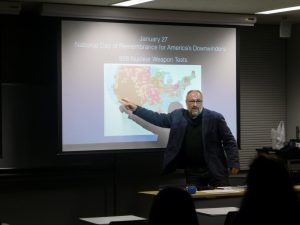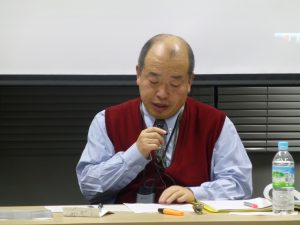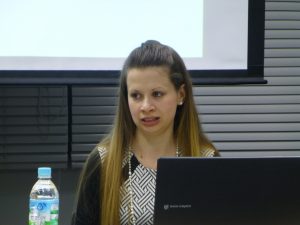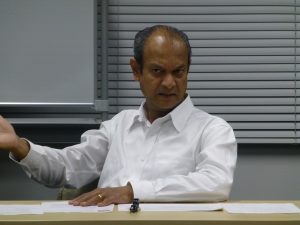The Hiroshima Peace Institute (HPI) held its second Public Lecture Series in English at the HCU Satellite Campus. In this program our lecturers presented a series of talks in English, focusing on intriguing topics in their fields of expertise. All lectures were free and open to the public.
----------------------------------------------------------------------------------------------------
Lecture 1
Date & Time: January 27, 2017, from 6 p.m. to 8 p.m.
Topic: "Domesticating Hiroshima in America in the Early Cold War"
Lecturer: Robert Jacobs, Professor, Hiroshima Peace Institute, Hiroshima City University
Abstract: This lecture will discuss how Americans came to envision Hiroshima in the early Cold War. It begins with a discussion of what Americans learned to think about the nuclear attacks on Hiroshima and Nagasaki in 1945, and how images of hibakusha were actually shown in American media in 1945 and 1946, contrary to what some scholars have claimed. It will then discuss how the word “Hiroshima” became altered in American discourse as a means of describing America as a potential victim of a nuclear attack rather than as the perpetrator of a nuclear attack. The lecture will argue that when Americans use the word “Hiroshima” they use it to describe themselves and not the actual citizens or the city of Hiroshima.
Profile of the lecturer: Jacobs is an American historian of the social and cultural aspects of nuclear technologies. His recent work focuses on a global cross-cultural study of radiation affected communities.
Lecture 2
Date & Time: February 3, 2017, from 6 p.m. to 8 p.m.
Topic: "The Marshall Islands ICJ Judgement: Preliminary Objections as Litigation Tactics"
Lecturer: Yasuhito Fukui, Associate Professor, Hiroshima Peace Institute, Hiroshima City University
Abstract: The purpose of this lecture is double-folded: to learn about the International Court of Justice (hereinafter referred to as "ICJ") and to enhance the participants’ understanding of nuclear disarmament. First of all, this lecture focuses on the explanation of basic elements of ICJ such as “applicant and respondent,” “preliminary objection,” “merit phase,” “absence of dispute” and so on, in order to understand basic function of the ICJ. Then, using the authentic text of judgement “Obligations concerning negotiations relating to cessation of the nuclear arms race and to nuclear disarmament (Marshall Islands vs. United Kingdom),” we would like to proceed to an analytical reading of this judgement focusing on important parts.
Profile of the lecturer: Born in 1964 in Hyogo Prefecture. LL.D. (Docteur en droit) from Université Paris 1 (Panthéon-Sorbonne). He specialises in international public law, especially disarmament law, international human rights law and international humanitarian law and so forth. His major publication is, among others, Gunshuku Kokusaiho no Kyoka (Strengthening the International Disarmament Law) published by Shinzansha Publisher Co., Ltd. in February 2015.
Lecture 3
Date & Time: February 10, 2017, from 6 p.m. to 8 p.m.
Topic: "Japanese Civilian-based Support of the Korean Atomic Bomb Survivors"
Lecturer: Ágota Duró, Doctoral Candidate, Hiroshima City University
Abstract: When two atomic bombs were dropped on Hiroshima and Nagasaki in August 1945, ten percent of the victims were Koreans. After Japan’s defeat, most returned to their liberated homeland where they were deprived of the same medical and legal rights afforded to the Japanese hibakusha. In the 1970s, a few Japanese became conscious of the abandonment of the Korean hibakusha and started to organize support movements locally. Son Jin-doo, the first Korean hibakusha to assert his rights at Japanese courts, had many Japanese supporters in Fukuoka, Hiroshima, and Tokyo, whose assistance contributed to the 1978 Supreme Court decision that ruled in his favor. There were other Japanese who helped individually, such as Masaharu Oka, who conducted surveys in the 1980s about the situation of the Korean hibakusha in Nagasaki and who raised consciousness of their problem nationwide; Torataro Kawamura, who was a pioneer in providing the Korean hibakusha with medical assistance, and Munetoshi Fukagawa, who launched his own investigation in the 1970s into the disappearance of 241 Korean hibakusha Mitsubishi forced laborers who had vanished at sea in September 1945, appealing for the return of their bodies to their homeland as well as connecting the hibakusha problem and Mitsubishi’s maltreatment of the Korean workers. Changes in the status of Korean hibakusha at political level could be accomplished due to Japanese civil society actors, whose devotion and assistance is a great example for their inclination for reconciliation between the two nations.
Profile of the lecturer: Ágota Duró is a native of Hungary, has a master's degree from the University of Debrecen in Hungary, and was a graduate researcher in Hirosaki for one and half years. This lecture presents the results of her doctoral research here in Hiroshima.
Lecture 4
Date & Time: February 17, 2017, from 6 p.m. to 8 p.m.
Topic: "Recent Developments in Myanmar Politics Under the NLD Government"
Lecturer: Narayanan Ganesan, Professor, Hiroshima Peace Institute, Hiroshima City University
Abstract: This talk will examine developments related to the new government that was sworn into office in April 2016. The National League for Democracy (NLD) government that is led by Aung San Suu Kyi has undertaken a number of policies that are different from those of the Thein Sein-led government that held power from 2010 to 2015. Special attention will be focused on the structuration of power in government and policies pertaining to the country’s political economy. This government has identified the peace process with the ethnic armed groups as its foremost agenda item so the talk will discuss the developments related to this issue in some detail. Then it will examine policies related to ethnic minority groups in general and new rules targeting problematic issues in governance and the economy. Finally the talk will detail aspects of the new government’s foreign policy.
Profile of the lecturer: Ganesan’s teaching and research interests are in Southeast Asian politics and foreign policy with a focus on issues that generate interstate and intrastate tensions.
Venue:
Seminar Room 2, Satellite Campus, Hiroshima City University
4-1-1 Otemachi, Nakaku, Hiroshima
9F Otemachi Heiwa Building




